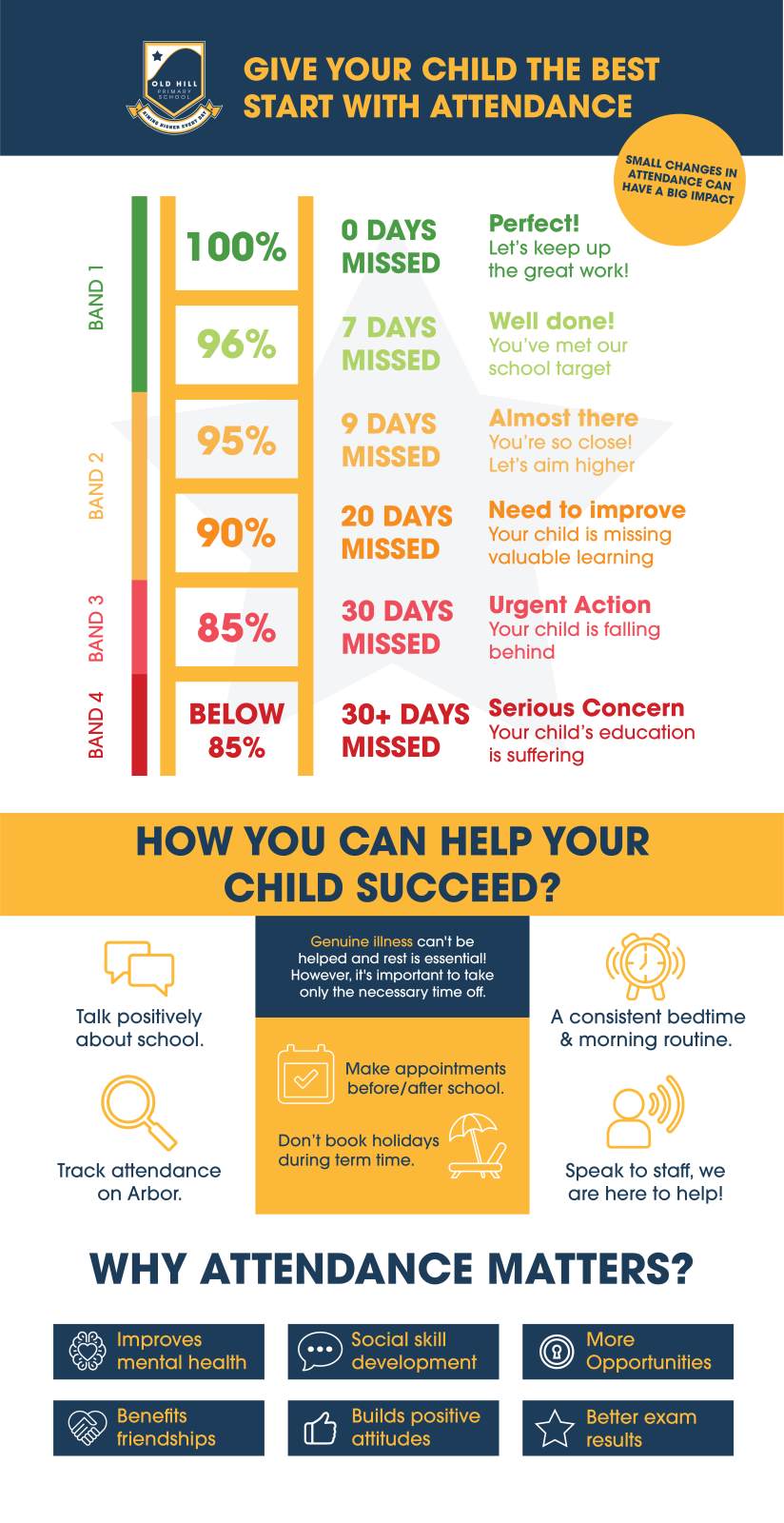Attendance
Attendance Matters
At Old Hill Primary and Nursery, we aim to nurture every pupil's talents and prepare them for success in life. Good attendance is essential and a legal requirement to support your child's future.
Illness and Medical Appointments
If your child is absent, call us each day by 9am on 01384 569213. Medical appointments should be outside school hours, but if unavoidable, your child should attend before and after.

Low Attendance
We will inform you if your child's attendance drops below 90%. Continued low attendance may require medical evidence and a meeting with the school to create an improvement plan. If attendance doesn't improve, we may involve the Local Authority.
Lateness
Pupils arriving after the close of registration will be marked as late, affecting their attendance record. Frequent lateness can harm your child's learning and confidence. If this becomes a pattern, we will ask to meet with you to discuss it further.
Collection
School ends at 3pm. We understand occasional delays, but frequent late pickups are not acceptable. Please ensure timely collection or alternative arrangements.
NHS Guidance for Illness
Children should remain off school for the following:
- Vomiting/diarrhoea: 48 hours after symptoms stop
- Chickenpox: 5 days after spots appear
- Impetigo: 48 hours after medication starts
- Scarlet fever: 24 hours after antibiotics
- Other guidance applies for illnesses like measles and scabies.
There is no need to stay off for minor conditions such as headlice, coughs, colds, or threadworms unless your child feels unwell.
Leave of Absence
Pupils cannot take time off for holidays during term time unless in 'exceptional circumstances'. Exceptional circumstances are rare, significant, unavoidable, and short. All requests must be in writing and approved by the headteacher. Unauthorised absences may result in penalty notices.
Fines for Unauthorised Absence
Any fines are handled by the local authority to fund attendance support. For clarity, our school does not receive any of this money.
Guiding Principles for Absence
- 1. Term Time is for Education:
The primary focus of term time is education. Families have 175 days off school, including weekends and holidays, to spend time together. Therefore, the head teacher will prioritise attendance, and the default policy is that absences will not be granted during term time except in exceptional circumstances.
- 2. Head Teacher's Discretion:
The decision to authorise a pupil’s absence lies with the head teacher, who will make this judgment based on the merits of each individual request.
- 3. Events Outside Term Time:
If an event can reasonably be scheduled outside of term time, it is unlikely that absence will be authorised for it. For example:
o Holidays or other travel, including those due to parental work commitments, are not considered ‘exceptional circumstances’.
o Absences due to the availability of cheaper fares or other costs are also not regarded as exceptional circumstances.
o Claims of illness that delay a pupil’s return after a school holiday will not be considered unless accompanied by travel tickets dated before school reopened or agreed dates. Medical documentation from abroad will not normally be accepted unless supported by travel documents showing dates before the school reopening.
- 4. Serious Illness or Bereavement:
Absences to visit seriously ill relatives or for the funeral of a close family member are typically considered ‘exceptional circumstances’. However, this applies only to the funeral service and necessary travel, not for extended leave. The head teacher must be satisfied that the circumstances are truly exceptional.
- 5. Parents' Weddings:
Absences to attend a parent's own wedding may be considered exceptional if the head teacher is satisfied that there is a compelling reason for holding the wedding during term time. Parents must provide clear evidence that the absence is an exceptional circumstance. In complex family situations, the head teacher may use their discretion, considering each case based on its individual merits and the child's overall welfare.
- 6. Religious Observances:
Absences for significant religious observances are often considered, but only for the ceremony and required travel, not for extended leave. This applies to one-off events rather than regular or recurring religious practices.
- 7. Military Families:
The needs of families of service personnel will be considered, particularly when a parent is returning from long operational tours that prevent family contact during regular school holidays.
- 8. Special Educational Needs and Disabilities:
Reasonable adjustments may be made for pupils with special educational needs or disabilities, which could result in leave being granted as an exceptional circumstance.
- 9. Family Trauma or Crisis:
Families may require time to recover from a trauma or crisis. In such cases, absence may be authorised if recommended by a health professional as part of the rehabilitation process for a parent or child dealing with medical or emotional issues.
- 10. Considerations for Absence Requests:
When deciding on absence requests, the head teacher will take into account:
• The pupil’s attendance record for the current and previous academic years.
• The timing of the absence in the school year. Requests that extend the beginning or end of a school holiday are unlikely to be considered exceptional.
- 11. Authorised Length of Absence:
The head teacher has the authority to determine both the length of the authorised absence and whether a particular absence qualifies as exceptional.







